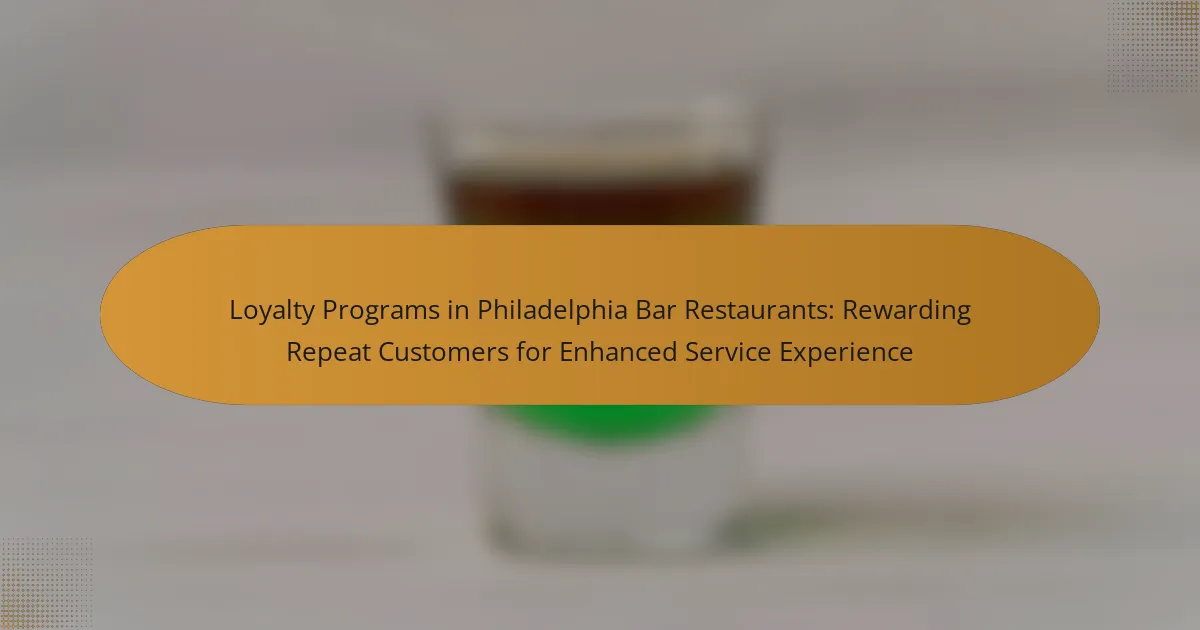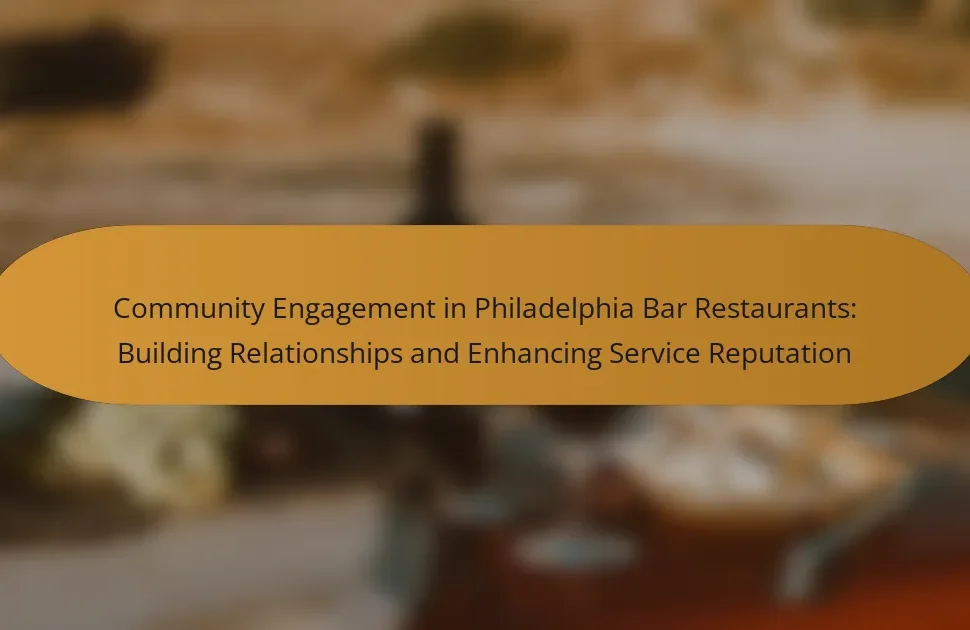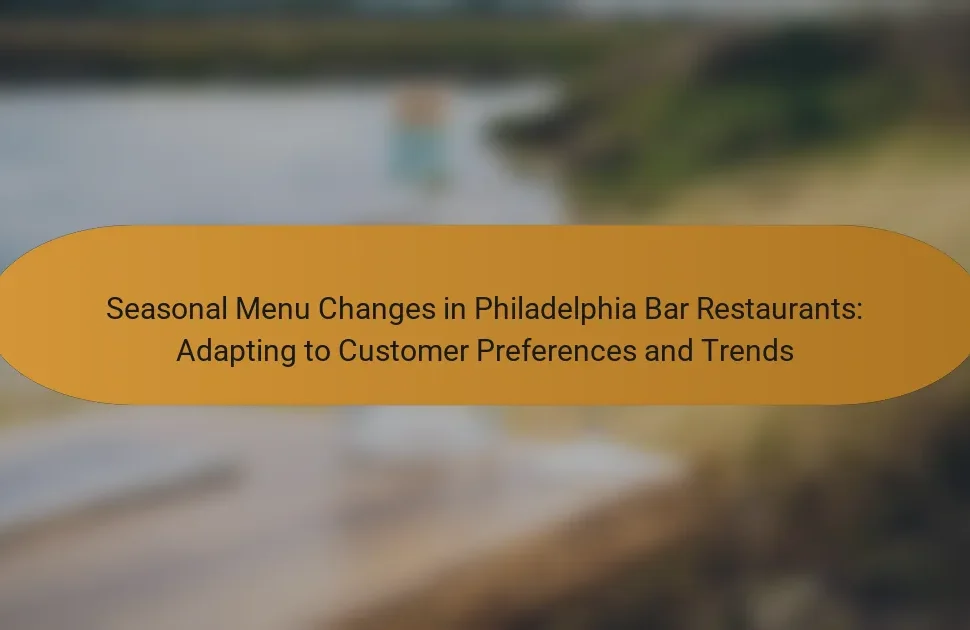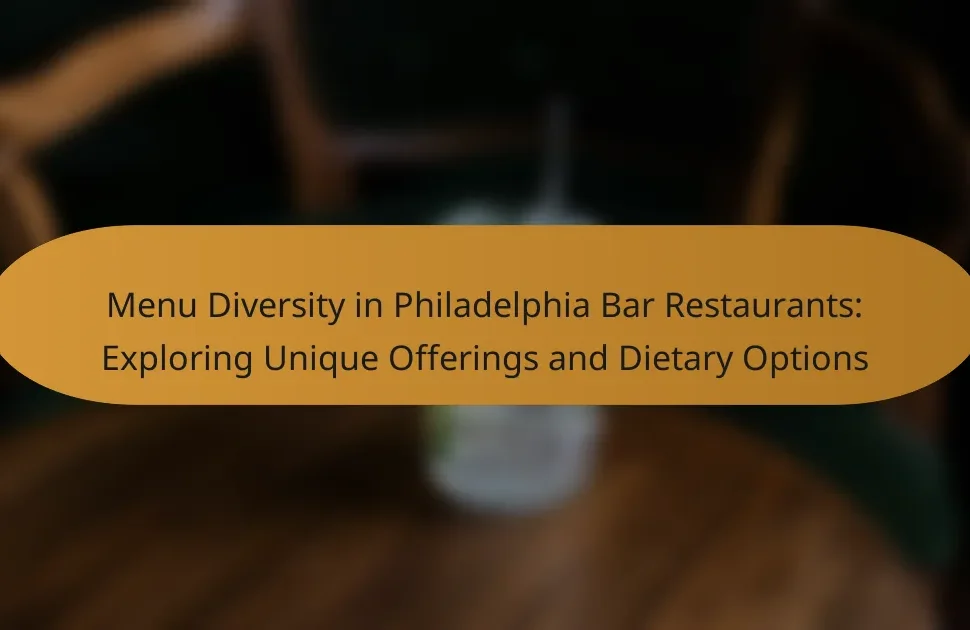
What are Loyalty Programs in Philadelphia Bar Restaurants?
Loyalty programs in Philadelphia bar restaurants are structured rewards systems designed to encourage repeat patronage. These programs typically offer customers points, discounts, or exclusive perks for frequent visits. They may include benefits such as free drinks, complimentary meals, or priority seating. Many establishments use mobile apps or loyalty cards to track customer purchases and rewards. According to a 2022 survey by the National Restaurant Association, 76% of consumers are more likely to visit a restaurant that offers a loyalty program. This demonstrates the effectiveness of loyalty programs in enhancing customer retention and satisfaction.
How do Loyalty Programs work in the context of bar restaurants?
Loyalty programs in bar restaurants reward customers for repeat visits and purchases. These programs typically offer points for each dollar spent. Customers accumulate points that can be redeemed for discounts, free items, or exclusive offers. Bar restaurants often use mobile apps or cards to track points. This incentivizes customers to return more frequently. According to a study by Bond Brand Loyalty, 79% of consumers are more likely to continue doing business with brands that offer loyalty programs. Implementing these programs can enhance customer retention and increase overall sales.
What components are essential for a successful Loyalty Program?
A successful loyalty program requires clear rewards, customer engagement, and data tracking. Clear rewards motivate customers to participate. Engaging communication keeps customers informed and interested. Data tracking enables the program to adapt based on customer behavior. Research shows that 70% of customers are more likely to recommend a brand with a good loyalty program. Additionally, personalized rewards can increase customer retention by 20%. These components work together to enhance customer experience and drive repeat business.
How do these components enhance customer engagement?
Loyalty programs enhance customer engagement by fostering a sense of belonging and reward. They incentivize repeat visits through points or discounts, encouraging customers to return. Personalized offers based on customer preferences increase satisfaction and loyalty. These programs also facilitate direct communication between the restaurant and customers. Engaged customers are more likely to provide feedback, which can improve services. Studies show that businesses with loyalty programs see a 20% increase in repeat customers. This engagement ultimately leads to higher revenue and customer retention rates.
What benefits do Loyalty Programs provide to customers?
Loyalty programs provide customers with rewards for repeat purchases. These rewards often include discounts, exclusive offers, and points that can be redeemed for products or services. Customers benefit from personalized experiences and tailored promotions based on their purchasing behavior. Studies show that loyalty program members spend 12-18% more than non-members. Additionally, loyalty programs foster a sense of belonging and connection to the brand. This connection can lead to increased customer retention and satisfaction. Overall, loyalty programs enhance the customer experience by providing tangible benefits and fostering brand loyalty.
How do Loyalty Programs improve the customer experience?
Loyalty programs improve the customer experience by providing rewards and incentives for repeat visits. These programs create a sense of belonging and appreciation among customers. They encourage customers to engage more frequently with the business. For example, a study by Bond Brand Loyalty found that 79% of consumers are more likely to continue doing business with brands that offer loyalty programs. Customers feel valued when they receive personalized rewards. This personalization enhances their overall satisfaction with the service. Additionally, loyalty programs often include exclusive offers and promotions. These benefits can lead to increased customer retention and higher spending per visit.
What incentives are typically offered to repeat customers?
Incentives typically offered to repeat customers include discounts, loyalty points, and exclusive promotions. Discounts often provide a percentage off future purchases. Loyalty points accumulate with each visit, redeemable for rewards. Exclusive promotions may include early access to new menu items or special events. These incentives aim to encourage customer retention and increase sales. Research shows that 70% of consumers are more likely to recommend a brand with a good loyalty program.
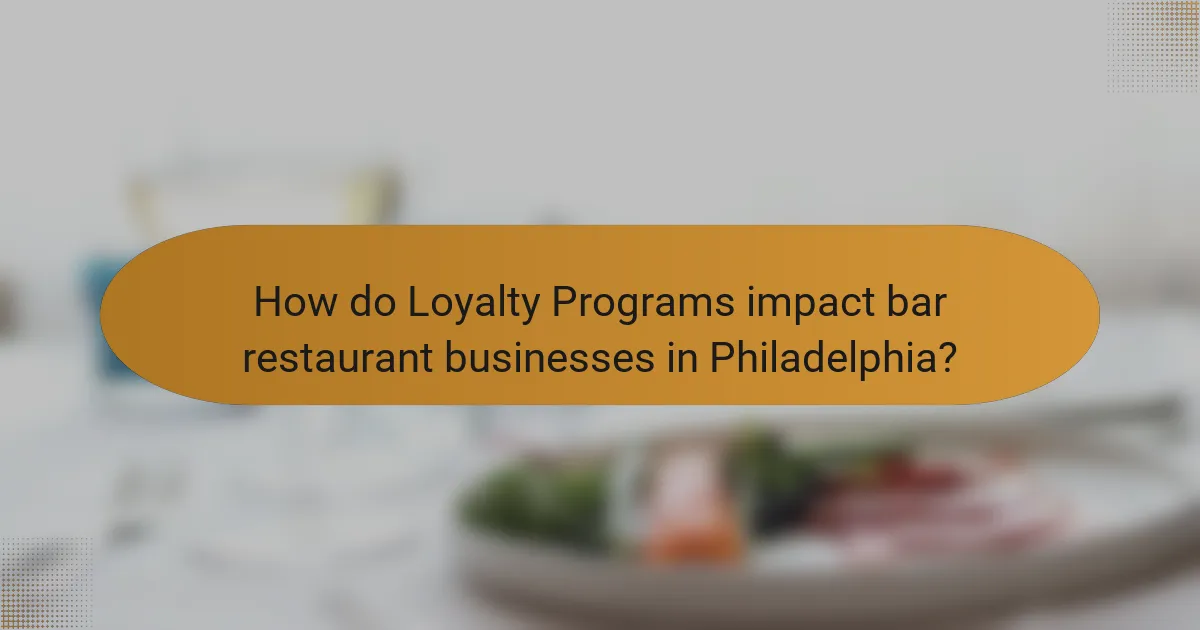
How do Loyalty Programs impact bar restaurant businesses in Philadelphia?
Loyalty programs significantly enhance bar restaurant businesses in Philadelphia. They increase customer retention by rewarding repeat visits. Customers are incentivized to choose the same establishment over competitors. This leads to higher sales and revenue growth. A study by the National Restaurant Association found that 70% of consumers are more likely to frequent a restaurant with a loyalty program. Additionally, these programs gather valuable customer data. This data helps businesses tailor marketing strategies and improve service. Overall, loyalty programs create a win-win situation for both customers and bar restaurants.
Why are Loyalty Programs important for customer retention?
Loyalty programs are important for customer retention because they incentivize repeat business. These programs reward customers for their loyalty with discounts, points, or exclusive offers. Research shows that loyal customers are more likely to make frequent purchases. According to a study by Bain & Company, increasing customer retention by just 5% can boost profits by 25% to 95%. Furthermore, loyalty programs create a sense of belonging among customers. This emotional connection encourages them to choose a brand over competitors. Overall, loyalty programs effectively enhance customer satisfaction and long-term engagement.
What role does customer loyalty play in business profitability?
Customer loyalty significantly enhances business profitability. Loyal customers tend to make repeat purchases, increasing overall sales. They are also more likely to spend more per visit compared to new customers. According to a study by Bain & Company, increasing customer retention rates by just 5% can boost profits by 25% to 95%. Furthermore, loyal customers often refer others, reducing marketing costs. They provide valuable feedback, helping businesses improve services. In summary, customer loyalty directly contributes to higher revenue and lower costs, driving overall profitability.
How can bar restaurants measure the success of their Loyalty Programs?
Bar restaurants can measure the success of their loyalty programs through several key metrics. Customer retention rates indicate how many customers return after joining the program. Increased frequency of visits shows if loyalty members are visiting more often than non-members. Average transaction value can reveal if members are spending more per visit.
Customer feedback and satisfaction surveys provide qualitative insights into the program’s effectiveness. Tracking redemption rates of rewards can indicate how engaged customers are with the program. Additionally, analyzing the cost of rewards versus increased revenue helps assess overall profitability.
Data from a study by the National Restaurant Association shows that 70% of consumers are more likely to choose a restaurant with a loyalty program. This statistic underscores the importance of measuring program effectiveness to enhance customer experience and drive revenue.
What challenges do bar restaurants face when implementing Loyalty Programs?
Bar restaurants face several challenges when implementing loyalty programs. One significant challenge is customer engagement. Many customers may not be aware of the program or its benefits. This lack of awareness can lead to low participation rates. Another challenge is technology integration. Selecting and managing the right software can be complex and costly. Data management is also an issue. Bar restaurants must ensure they can effectively track customer purchases and preferences. Additionally, competition poses a challenge. Many establishments offer similar programs, making differentiation difficult. Finally, maintaining program relevance is crucial. Programs must evolve to meet changing customer expectations and preferences.
How can bar restaurants overcome common obstacles?
Bar restaurants can overcome common obstacles by implementing effective loyalty programs. These programs encourage repeat patronage and enhance customer experience. They can offer rewards such as discounts, exclusive menu items, or special events. Studies show that loyalty programs increase customer retention by 5-10%. Additionally, bar restaurants can utilize customer feedback to identify pain points. Addressing issues promptly can improve service quality. Training staff to deliver exceptional service is crucial. According to research, well-trained employees boost customer satisfaction significantly. Lastly, leveraging social media for promotions can attract new customers while retaining existing ones.
What are the risks associated with poorly designed Loyalty Programs?
Poorly designed loyalty programs can lead to customer dissatisfaction. Customers may feel that the rewards are unattainable or not worth the effort. This can result in decreased engagement and lower repeat visits. Additionally, poorly structured programs can create confusion about how to earn and redeem rewards. Lack of clarity can frustrate customers and diminish their overall experience. Financially, businesses may incur unnecessary costs from unclaimed rewards. A study by Harvard Business Review found that 70% of loyalty program members do not fully understand the program. This misunderstanding can lead to wasted resources and lost revenue. Ultimately, ineffective loyalty programs can harm brand loyalty and customer retention.

What specific types of Loyalty Programs are popular in Philadelphia bar restaurants?
Popular types of loyalty programs in Philadelphia bar restaurants include punch cards, point systems, and membership clubs. Punch cards reward customers with a free item after a set number of purchases. Point systems allow customers to earn points for each dollar spent, redeemable for discounts or free items. Membership clubs offer exclusive benefits, such as special discounts or early access to events, for a subscription fee. These programs enhance customer retention and encourage repeat visits. According to a 2022 survey by the National Restaurant Association, 70% of patrons prefer establishments with loyalty programs, highlighting their effectiveness in attracting and retaining customers.
How do point-based Loyalty Programs function?
Point-based loyalty programs function by allowing customers to earn points for every purchase they make. These points accumulate over time and can be redeemed for rewards, such as discounts or free items. Customers typically register for the program and receive a loyalty card or mobile app to track their points. Each time a customer makes a qualifying purchase, points are added to their account. The more a customer spends, the more points they earn. Businesses often set specific thresholds for redeeming points, encouraging repeat visits. According to a study by Bond Brand Loyalty, 79% of consumers say loyalty programs make them more likely to continue doing business with a brand.
What are the advantages of point-based systems for customers?
Point-based systems provide customers with tangible rewards for their purchases. These systems enhance customer engagement by incentivizing repeat visits. Customers can accumulate points, which can be redeemed for discounts or free items. This encourages loyalty and increases overall spending. Additionally, point-based systems often create a sense of achievement for customers. They feel rewarded for their loyalty, which can improve their overall satisfaction with the brand. Research shows that loyalty programs can increase customer retention rates by up to 5%. This retention leads to increased profitability, as acquiring new customers is often more costly than retaining existing ones.
How do point-based systems benefit bar restaurant owners?
Point-based systems benefit bar restaurant owners by enhancing customer loyalty and increasing repeat business. These systems incentivize customers to return by offering rewards for their purchases. As a result, owners can boost sales and improve customer retention rates. Research shows that loyal customers spend 67% more than new ones. Additionally, point-based systems provide valuable data on customer preferences and behaviors. This data can help owners tailor marketing strategies effectively. Overall, point-based systems create a win-win scenario for both customers and bar restaurant owners.
What are tiered Loyalty Programs and how do they operate?
Tiered loyalty programs are structured reward systems that offer benefits based on customer engagement levels. Customers earn points or status by spending money or visiting a business. As customers accumulate points, they ascend through different tiers. Each tier provides increasingly valuable rewards and exclusive offers. For example, a basic tier might offer discounts, while a premium tier could include free items or special access to events. This structure encourages repeat visits and higher spending. Research indicates that tiered programs can increase customer retention by up to 20%. Overall, tiered loyalty programs effectively incentivize customer loyalty and enhance the overall service experience.
What unique advantages do tiered programs offer to customers?
Tiered programs offer customers unique advantages such as increased rewards and personalized experiences. Customers in higher tiers receive more significant benefits compared to lower tiers. This structure incentivizes repeat visits and enhances customer loyalty. For example, a study by Accenture found that 77% of consumers are more likely to stay loyal to brands that offer personalized rewards. Additionally, tiered programs often provide exclusive access to events or promotions, making customers feel valued. These advantages create a sense of achievement and encourage ongoing engagement with the brand.
How can tiered programs increase customer spending?
Tiered programs can increase customer spending by incentivizing higher purchase levels. Customers are motivated to spend more to reach the next tier for better rewards. This strategy creates a sense of urgency and competition among customers. Research shows that tiered loyalty programs can enhance customer retention by up to 20%. As customers progress through tiers, they experience increased benefits, such as discounts or exclusive offers. This encourages repeat visits and larger transactions. Additionally, customers may feel a psychological commitment to achieve higher status, leading to increased overall spending.
What best practices should Philadelphia bar restaurants follow when designing Loyalty Programs?
Philadelphia bar restaurants should create loyalty programs that are easy to understand and use. Clear communication of rewards encourages customer participation. Offering tiered rewards can motivate customers to spend more. Personalizing rewards based on customer preferences increases engagement. Implementing a mobile app for tracking points enhances convenience. Regularly updating rewards keeps the program fresh and exciting. Promoting the program through social media can attract new members. Analyzing customer data helps refine the program for better results.
How can bar restaurants effectively promote their Loyalty Programs?
Bar restaurants can effectively promote their Loyalty Programs through targeted marketing strategies. Utilizing social media platforms increases visibility and engagement with potential customers. Email marketing campaigns can directly inform existing customers about program benefits and exclusive offers. In-store promotions, such as signage and staff recommendations, can encourage sign-ups during visits. Collaborating with local businesses can expand reach and attract new customers. Offering immediate rewards for joining, like discounts or free items, incentivizes participation. Regularly updating customers on their loyalty status enhances engagement. Statistics show that businesses with effective loyalty programs can see a 20% increase in repeat visits.
What strategies can enhance customer participation in Loyalty Programs?
To enhance customer participation in loyalty programs, bar restaurants can implement targeted strategies. Offering personalized rewards tailored to customer preferences increases engagement. Engaging customers through regular communication fosters a sense of community. Utilizing gamification elements, such as point systems or challenges, can motivate participation. Providing exclusive access to events or promotions creates a sense of urgency and value. Simplifying the sign-up process encourages more customers to join. Regularly updating rewards keeps the program fresh and exciting. According to a study by Bond Brand Loyalty, 79% of consumers are more likely to engage with a brand that offers personalized experiences.
Loyalty programs in Philadelphia bar restaurants are structured reward systems aimed at encouraging repeat patronage through points, discounts, and exclusive perks. These programs enhance customer retention by providing tangible rewards and fostering a sense of belonging, ultimately leading to increased sales and profitability for businesses. Key components for success include clear rewards, customer engagement, and effective data tracking, while popular formats include point-based systems and tiered programs. The article further explores the benefits of loyalty programs for both customers and restaurant owners, as well as strategies for effective implementation and promotion.
